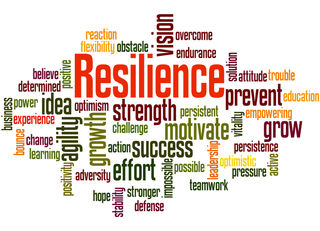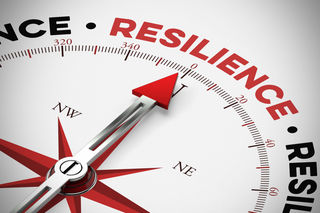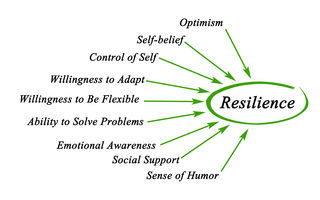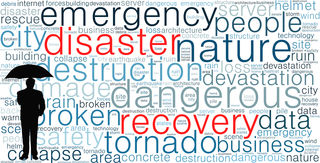Resilience
Fostering Resilience: Israeli Style
Israeli trauma experiences are helping to heal the world.
Posted January 13, 2020 Reviewed by Ekua Hagan

Resilience has become a popular catchphrase. I previously wrote about resilience with some suggestions on how to foster it. Let’s take a step back and define what it means to be resilient.
Adversity is a fact of life. Resilience is that ineffable quality that allows some people to bounce back after being knocked down by life. It allows positive behavioral adaptations in the face of stress, threats, and adversity. Resilience: Why Things Bounce Back (Zolli and Healy) defines resilience as “the capacity of a system, enterprise, or a person to maintain its core purpose and integrity in the face of dramatically changed circumstances.”
The American Psychological Association has suggested “10 Ways to Build Resilience” including developing self-confidence, taking decisive action and maintaining hope. Resilience skills necessary to bounce back psychologically after an illness are different than those required after a terrorist attack or the death of a loved one. However, there are some commonalities in terms of resilience which are useful across stressors.
Rather than letting difficulties or failure overcome or define them and drain their resolve, resilient people find ways to rise from the ashes. Psychologists have identified some of the factors that make a person resilient; optimism, positive attitude, ability to regulate emotions, and ability to see apparent failure as a positive learning consequence.
Resilient people tend to be self-confident and intelligent. They are risk-takers, have a strong desire to learn, and are able to identify and access social, psychological, and physical resources that help maintain their well-being. Whether having these traits makes people more resilient or being resilient results in people gaining these beneficial qualities is not known.
While optimism blunts the impact of stress on the mind and body in the wake of challenging experiences, it is difficult to find the silver lining when your family was the victim of a terrorist attack. Accessing your cognitive resources enables productive analysis of what might have gone wrong and offers alternative behavioral paths that could be more productive. Resilience requires real mental work to transcend hardship.
Why do we care about resilience?
Burnout is significant: 30 to 50 percent of physicians experience burnout. Resilience is also needed by children growing up in stressful and abusive homes, dealing with the loss of loved ones, coping with natural disasters—hurricane, flood, tornado, or with challenging illnesses, accidents, or terrorist attacks. Resilience allows us to pursue our goals despite external factors which might otherwise thwart our actions.
Those with low resilience often blame external stressors, become overwhelmed, dwell on problems, and suffer negative consequences of distress. Highly resilient people tend to take more personal responsibility, minimize blame, and look at stressors as a healthy challenge rather than an immobilizing threat.

While some challenges are greater than others, we are all faced with stresses, changes in circumstances, and adversities: car breaks down, loved one dies, job loss, financial issues, illness, didn’t get that client, going through a divorce, etc.
Resilience research by sociologist Dr. Emmy Werner showed that about one-third of kids do not seem to be affected by poverty, alcoholism, and abuse in their homes. Many of the remaining two-thirds become troubled teens. Peter Schulman (Journal of Selling and Sales Management) showed that optimistic insurance salespeople sold 35 percent more than pessimists and were half as likely to quit in the first year. While there is a genetic component to resilience, it is also a learned trait.

The Israel Trauma coalition (ITC) was created in 2002 (when Israel experienced an unprecedented number of terrorist attacks) to combat trauma and enhance resilience. Israel is the perfect place to study resilience because, unfortunately, traumatic experiences are an everyday occurrence, and trauma preparedness and response are necessities.
The initial purpose of the ITC was to collect knowledge, expertise, and experience of Israel’s leading trauma management centers and government organizations to provide direct care for those in need. The ITC has five city-wide Resilience Centers in southern Israel where 1,200 Israelis have been treated. Disaster preparedness training has also been provided to over 4,000 professionals in councils, hospitals, schools, and businesses, the goal being to empower local staff to treat trauma, anxiety, and stress.
Tikkun Olam
Tikkun Olam is a Hebrew term meaning "healing the world." The ITC has expanded beyond Israel to aid the international community with professional training, developing community resilience and enhancing national emergency preparedness. The coalition sends teams all over the world to train local professionals and clinicians to manage traumas, promote rehabilitation, and create resilient, self-sustaining societies. It is to places and situations like hurricane Harvey in Houston, the Boston Marathon bombing, typhoon Haiyan in the Philippines, the earthquake in Haiti, the tsunami in Japan, the school shooting in France, and terrorist attacks in Mumbai that the ITC provides psychological support and training.
In the first few days following a major adverse event, Israel sends immediate and short-term humanitarian relief—such as medical care and debris clean up. The ITC then makes connections and assesses specific community needs in terms of psychosocial resilience, stress management, education, school and religious support, etc. They leave direct patient care to local experts who are better able to deliver effective treatment in a language and culturally sensitive manner. Early psychosocial interventions seem to decrease the likelihood and severity of later PTSD.

ITC is working with European countries to prepare vulnerable populations like the vision- and hearing-impaired, elderly, youth and those with disabilities for disasters. One of their principles in helping people deal with trauma is to train the trainer. These sessions have been held in places like France, Sri Lanka, Mumbai, Germany, Japan, and Haiti.
One of the more important tactics is to build resilience so that people can more quickly return to routines and not become victims. Acknowledging feelings and telling their story allowed people (including traumatized professionals) to gain a better perspective and more clearly channel their resources and see the importance of life beyond the trauma.
Again, as Israel is unfortunately one of the leading countries in the world on the receiving end of traumatic events, there are other agencies also working towards maintaining mental health and fostering resilience. One such agency, Amcha, is the national Israeli center for psychosocial treatment and social support of Holocaust survivors (about 20,000 served) and their families. These were children who suffered from hunger, persecution, torture, loss, and abandonment.
Another Israeli agency, NATAL, is the Israeli Trauma Center for Victims of Terror and War. NATAL has touched the lives of hundreds of thousands of people who suffered trauma; promoting emotional strength and resilience through treatment, prevention, public awareness, and research.
Stressors come in many shapes and sizes. While stress is somewhat subjective, frequent traumatic events may lead to decompensation or great achievements depending on our level of resistance. Israel is an example of a resilient people in a resilient nation.
Thanks for following—comments are always appreciated.
My next blog post will discuss the intense stress incurred by Israeli Yamam (anti-terrorist police unit) and how they foster ultimate resilience.




